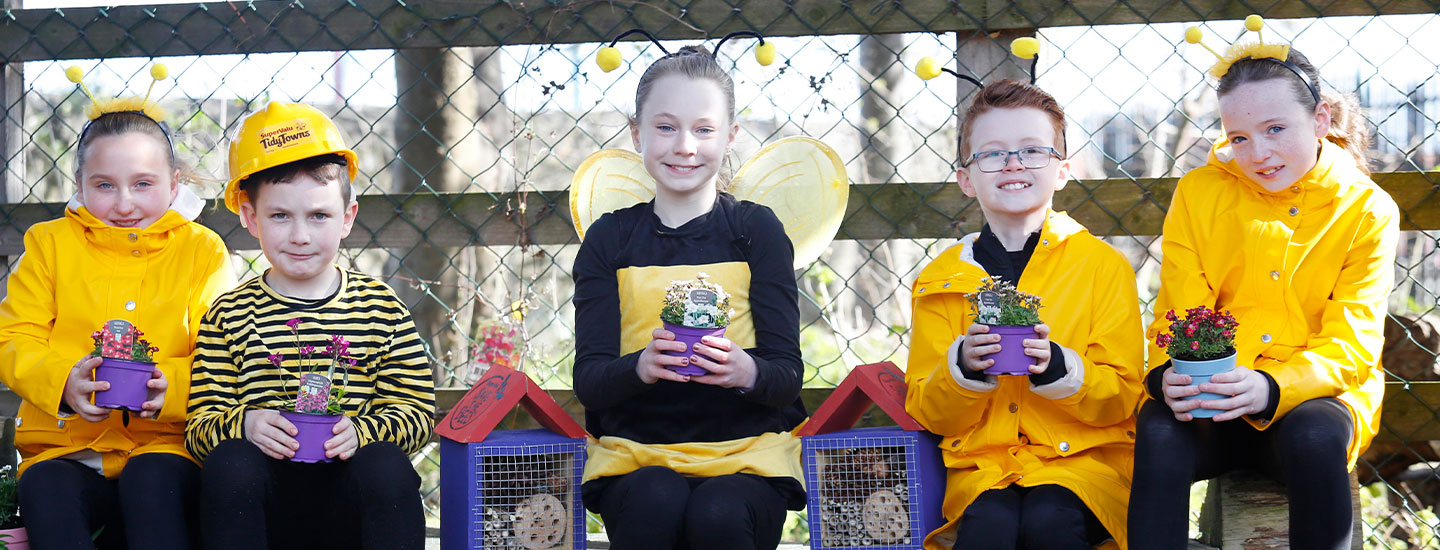At home

Did you know one of the main reasons our Irish bee population is in danger is because of a lack of food and safe habitats. There are some very simple steps you can take in your home garden that will have a hugely positive impact on saving the bees and improving the biodiversity of your local community.
Why not take some positive steps today like:
-
Letting the Dandelions bloom
Dandelions provide vital food for hungry bees in spring.
-
Making the most Of Your Space
Plant pollinator-friendly flowers in any free green areas of your garden or in window boxes or outdoor plant pots.
Although bees are hugely important, we must remember that without flowers bees would not exist. This list of plants are good sources of nectar and/or pollen for various types of bees. They will also provide food for other insects like butterflies.
-
Reducing Mowing
Mow every 6 weeks from mid-April to allow flowers like clover to grow and provide food.
-
Creating Safe Habitats for Bees
Remember not all Bees live in hives. Bumble Bees and Solitary bees need safe places to live too. Why not provide some safe places for bumblebees or solitary bees to make their nests in your garden.
Letting hedgerows grow. Bumblebees love to make their nests in long grass at the bottom of hedgerows.
Most solitary bees will burrow into banks of bare soil to make a little cosy nest. They like these banks to be south facing so the sun warms them up in the morning. You might have some areas in your garden where you can scrape back some grass to create a bare bank of soil.
Bee Hotels provide a safe habitat for Bees and insects, Fix the hotel to a South or East-facing wall or fence, so it gets plenty of morning sun, around 1.5m off the ground. Plant bee-friendly flowers underneath your hotel to give them a nearby food source.
Bee Hotels are easy to make - find out how here.
If you find a nesting or hibernating bee in areas like long grass, bare soil or wood, don’t disturb it. Just leave it alone so that it can carry out its important pollination work.
-
Don’t Spray
The overuse of herbicides is making it difficult for pollinators to find enough flowers to feed from.
-
Don’t be afraid of bees
Wild bees will never attack humans (even if threatened). If one comes near you, just sit still and it will fly off once it realises you are not a flower.
-
Recording your actions
Log your actions on pollinators.ie to help us track the increase in pollinator resources in the landscape! Use your save the bees Cards to help you identify the different types of bees in your garden or window box.
-
Getting involved with your Local TidyTowns group
There are over 1,000 TidyTowns groups across Ireland working to make our communities better. To find out how you can get involved visit www.tidytowns.ie
List of bee friendly plants
Flower/Plant |
Flowering Period |
|
|
Aster |
Autumn |
|
|
Borage |
Spring-Autumn |
|
|
Crab Apple |
Spring |
|
|
Crocus |
Winter |
|
|
Dandelion |
Spring |
|
|
Grape Hyacinth |
Spring |
|
|
Lamb’s-ear |
Summer |
|
|
Lavender |
Summer |
|
|
Oxeye Daisy |
Summer |
|
|
Rosemary |
Spring-Summer |
|
|
Sunflowers |
Summer |
|
|
Wallflower |
Spring-Summer |